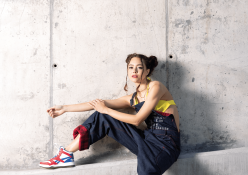Trend forecasting is not merely a guess in the dark as to what’s hot and what’s not. It’s a precise, research-intensive art, even science, that Nicola Cooper is well on her way to mastering
Trend analyst and cultural strategist for her own company Nicola Cooper & Associates as well as in-house trends analyst at 99c, Nicola Cooper is at the forefront of the South African fashion scene. The fashion industry is a tough nut to crack. It is fast-paced and essentially all subjective, so we sat down with Nicola to figure out how she does it.
When did you start your trend-forecasting journey?
Trend analysis and forecasting is a very new career and was born out of the information overload. It has become a complex science of research and analysis in order to track notable changes that are happening at a very fast pace.
Trend analysis did not really exist when I was younger or even when I was studying. Growing up in a small town in the former Transkei with activist and liberal parents,
I didn’t really fit in with my white peers and counterparts. I immersed myself in the activist, feminist, punk and skateboarding space. And during my varsity days, I became incredibly interested in researching the formation of identity in African cultures, subcultures and countercultures – specifically in how they manifest themselves through fashion, music, lifestyle and marks of identification in street style.
After working in the skateboarding industry for almost 10 years, I moved into a role as on-air producer for MTV Base. MTV Base’s creatives were located in Milan and, later, in Poland, and this is when I began to understand the importance of something looking universal. I then went on to ‘learn’ by ‘teaching’ and taught Trend Analysis at tertiary level to 500 kids a week. Thereafter, I was approached by my mentor Dion Chang of FLUX Trends, to head up his fashion, lifestyle and pop culture division.
Now I run my own trend research, analysis and strategy firm, as well as being an in-house trend analyst within an amazing, forward-thinking agency.
Who was your inspiration growing up?
My mom is an entrepreneur, so I was exposed to business from a young age and my dad always supported and encouraged equality and feminism. I also come from a strong working class, fashion family. My grandmother was a machinist and weaver in a factory, my grandfather was an electrician who repaired machines, my dad was a knitwear manufacturer at one stage and my mom was the Regional Manager for Foschini in the Transkei before opening her own business. I never thought
I would go into fashion, but I guess you could say it was in my blood.

What does your morning routine consist of?
A good cup of coffee, breakfast (on busy days I forget to eat – so this is vital) and going through the news and social media while hanging with my two fur kids Jimi
Bear and Bowie. I also have a daily reading that sets my mindset for the day and this usually manifests into #MyMorningMantra, which I share on social media. I am optimistic, passionate and positive by nature, which I am sure annoys the hell out of some folk. But hey, it got me this far!
How do you know which trends are the ones that will stick?
Trends are never about me, my likes or my taste. For me it is always about the consumer: who they are, what they deal with day to day, what their aspirations are, and then asking how we can give them access to trends at their price point.
Which styles and trends are you most looking forward to in 2020?
I am really looking forward to the introduction of new colours and textures. It always indicates the mood, tone or zeitgeist for the year. And I am always interested in street style, because for me that is where fashion lives in Africa.
The evolution of teen- and tween-targeted clothing, how we are going to take care of those who make our clothing, and how sustainability is going to impact us are imperative topics. Our youth market is one of the largest in the world. I am so excited to see them grow as consumers in South Africa. The youth of the world and our country give me hope.
Which factors are considered when forecasting trends?
It is really a combination of many things, from our gatekeepers, music, media, politics, technology, sociology, the economy, colour psychology, and one of the most important is how history impacts the future. In every way, we always need to understand the past to better conceive the future.
WHat does your firm do for its clients?
A lot of the time I get to present very frank knowledge in boardrooms and to have some very complex conversations. I want to make sure that our consumers are heard and are respected, and that their hard-earned money is valued. We need to view our consumers as real people, not just numbers.
Subscribe to Club for more on style, life and savings.





